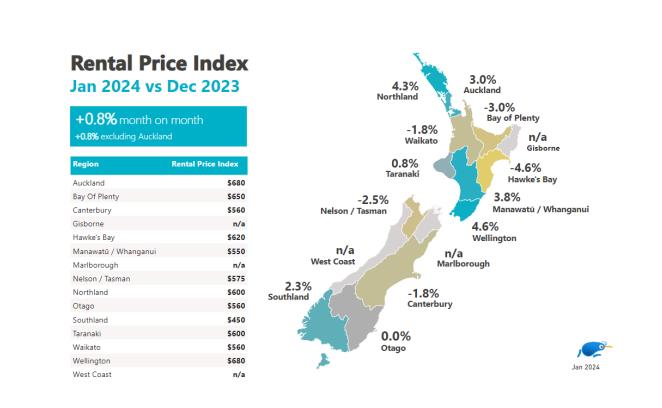Rental prices are continuing to rise around the country, with urban properties reaching record highs, according to the latest data from Trade Me.
Trade Me's latest Rental Price Index released on Thursday morning shows the national median weekly rent in Aotearoa has jumped to $630 for January - up 0.8 percent compared to December 2023.
The data also reveals rental prices have increased for the second consecutive month, including rents for apartments and townhouses which have climbed to record highs.
Trade Me's property sales director Gavin Lloyd said the first month of the year could be a telling sign of the year ahead.
"Renters were for the most part sheltered from any major price increases for rental properties at the end of 2023 but this may change if the Reserve Bank decides to raise the official cash rate next week in their first meeting of the year," Lloyd said.
"As borrowing costs rise, landlords may face increased expenses, and some could pass on these costs to tenants through higher rents. This change might make it a bit tougher for renters with the rising cost of living and lack of properties available giving them fewer options when searching for a property."
The Reserve Bank (RBNZ) has left the 5.5 percent OCR unchanged for its past five meetings, after tightening it 12 consecutive times before that.

Auckland reclaims highest place to rent
After the Bay of Plenty overtook Auckland with the highest rental price last month, Tāmaki Makaurau returned to the top spot in January.
The average median rent in the City of Sails went up by 3 percent compared to last month, reaching a high of $680 per week whilst the Bay of Plenty market dropped by 3 percent to $650 per week.
The increase in Tāmaki Makaurau was driven by North Shore City which recorded an uptick of 4.2 percent to $720 a week and Waitakere City which is up 2.3 percent to $665 a week.
"As people in New Zealand got back to their normal routines in January, the cost of renting a place followed similar patterns to the previous year," Lloyd said.
"This is largely driven by the supply of properties not keeping up with demand. In January we saw demand increase by 61 percent in Auckland compared to December - which will be contributing to higher rental prices."
While Auckland might be at the top end of the scale for places to rent, at the other end of the country, Southland retained its status as the most affordable place to rent in New Zealand.
For any Kiwis looking for a bargain, the data showed Southland's median rent was $450 per week, marking a slight $10 increase from December.
Record highs for apartments and townhouses
The data also revealed new records for apartments and townhouses.
The median weekly rent for an apartment in New Zealand peaked at $560 per week in January and townhouses reached $665 per week.
Auckland townhouses also reached an all-time high of $730 up five percent compared to the same time last year.
Units in Christchurch also saw a large jump, up 12.5 percent making the median rent $450.
"As net migration is almost at an all-time high more people are coming into the country looking for entry-level rentals like apartments and townhouses - especially as they are more prevalent in our city centres. This increase in demand is likely putting pressure on the supply and impacting prices," Lloyd said.

Demand returns after holiday period
As the holiday period came to an end, more rental properties came onto the market, with supply up 15 percent compared to December.
Wellington had the biggest increase with a boost of 38 percent in the number of rentals available, followed by Taranaki which experienced a 20 percent increase.
Demand also skyrocketed by 61 percent compared to December; however, when compared to the same time last year, it's down by 11 percent.
"Coming into 2024, a lot of Kiwi are searching for a new rental property - this is especially evident in Wellington, which saw an increase in demand by 94 percent," Lloyd said.
"Southland and Auckland also saw a surge in demand; this could be due to people wanting a change of scenery in the new year."


